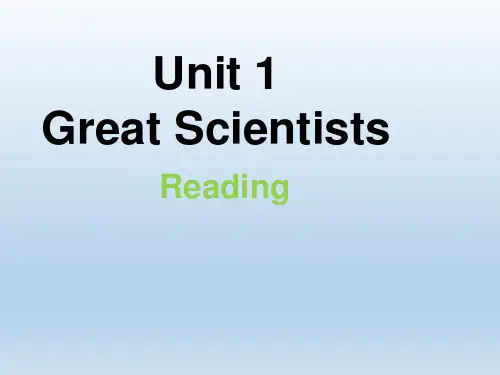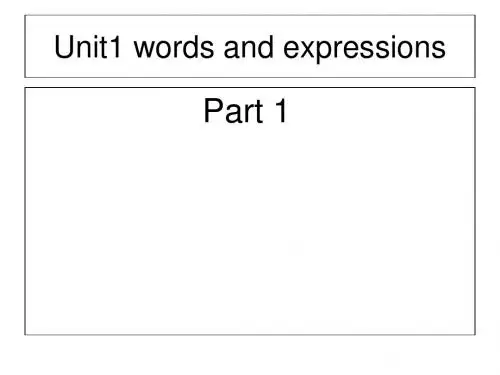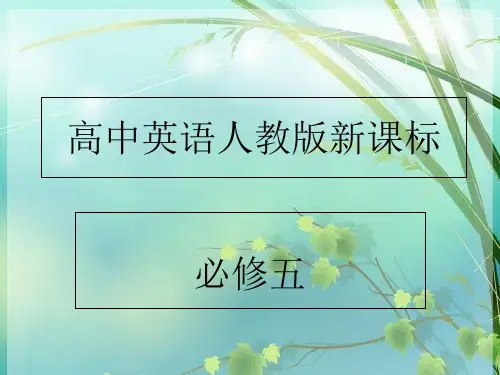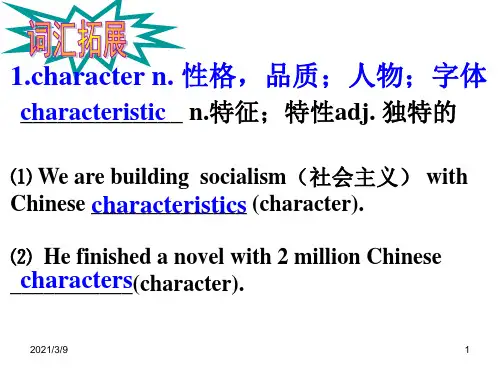高中英语必修五_unit1_单词课件.ppt
- 格式:ppt
- 大小:639.12 KB
- 文档页数:43
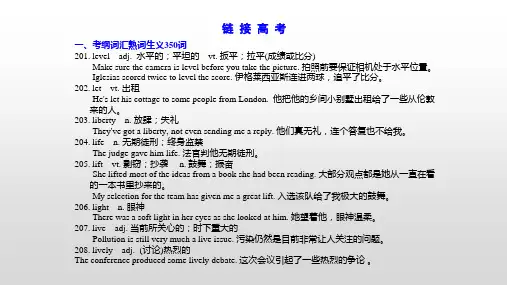
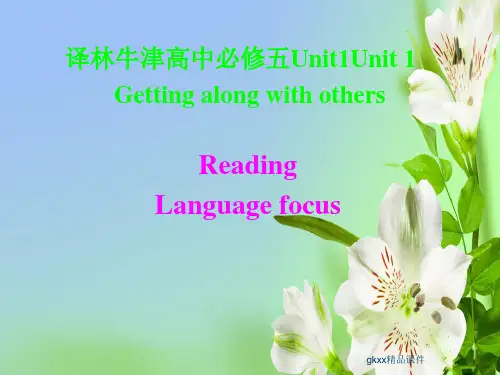
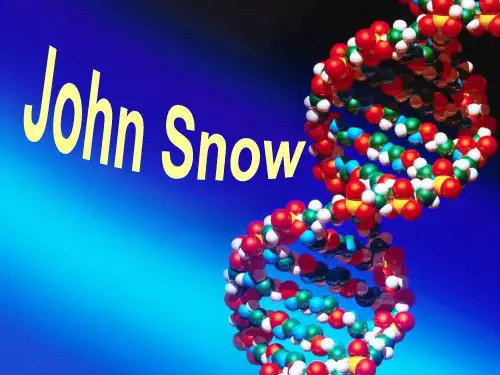
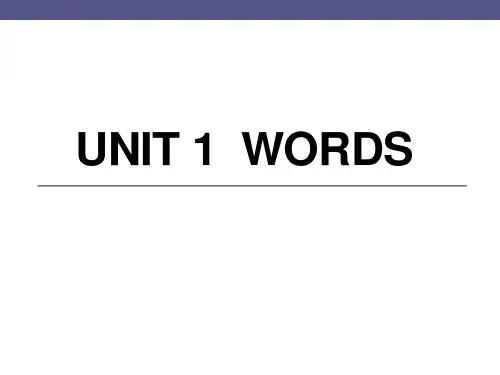
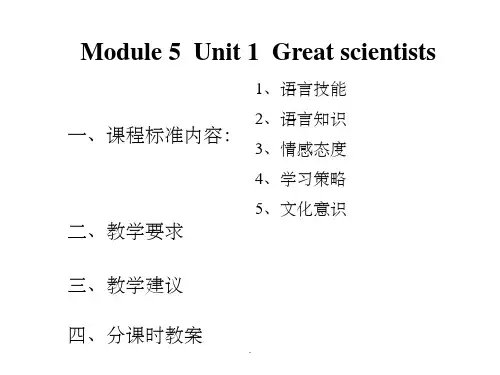
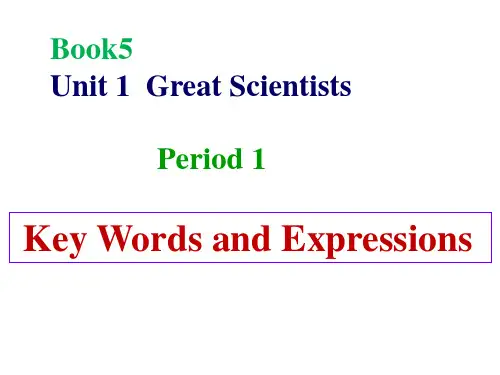
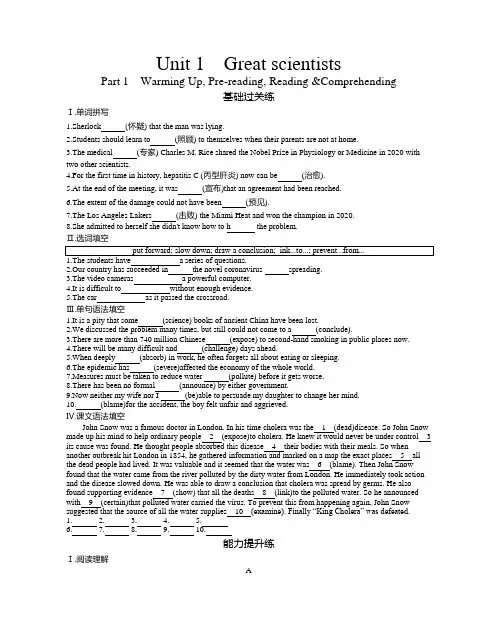
Unit 1Great scientistsPart 1Warming Up, Pre-reading, Reading &Comprehending基础过关练Ⅰ.单词拼写1.Sherlock(怀疑) that the man was lying.2.Students should learn to(照顾) to themselves when their parents are not at home.3.The medical(专家) Charles M. Rice shared the Nobel Prize in Physiology or Medicine in 2020 with two other scientists.4.For the first time in history, hepatitis C (丙型肝炎) now can be(治愈).5.At the end of the meeting, it was(宣布)that an agreement had been reached.6.The extent of the damage could not have been(预见).7.The Los Angeles Lakers(击败) the Miami Heat and won the champion in 2020.8.She admitted to herself she didn't know how to h the problem.Ⅱ.选词填空2.Our country has succeeded in the novel coronavirus spreading.3.The video cameras a powerful computer.4.It is difficult to without enough evidence.5.The car as it passed the crossroad.Ⅲ.单句语法填空1.It is a pity that some(science) books of ancient China have been lost.2.We discussed the problem many times, but still could not come to a(conclude).3.There are more than 740 million Chinese(expose) to second-hand smoking in public places now.4.There will be many difficult and(challenge) days ahead.5.When deeply(absorb) in work, he often forgets all about eating or sleeping.6.The epidemic has(severe)affected the economy of the whole world.7.Measures must be taken to reduce water (pollute) before it gets worse.8.There has been no formal(announce) by either government.9.Now neither my wife nor I (be)able to persuade my daughter to change her mind.10.(blame)for the accident, the boy felt unfair and aggrieved.Ⅳ.课文语法填空John Snow was a famous doctor in London. In his time cholera was the1(dead)disease. So John Snow made up his mind to help ordinary people2(expose)to cholera. He knew it would never be under control3 its cause was found. He thought people absorbed this disease4their bodies with their meals. So when another outbreak hit London in 1854, he gathered information and marked on a map the exact places5all the dead people had lived. It was valuable and it seemed that the water was6(blame). Then John Snow found that the water came from the river polluted by the dirty water from London. He immediately took action and the disease slowed down. He was able to draw a conclusion that cholera was spread by germs. He also found supporting evidence7(show) that all the deaths8(link)to the polluted water. So he announced with9(certain)that polluted water carried the virus. To prevent this from happening again, John Snow suggested that the source of all the water supplies10(examine). Finally “King Cholera” was defeated.1. 2. 3. 4. 5.6. 7. 8. 9. 10.能力提升练Ⅰ.阅读理解A(2021河北沧州高二上月考,)If you were asked to imagine a scientist, what image would come to your mind? The idea that most of the kids have is a man wearing a white lab coat with messy hair, big glasses, and cups of colorful liquids giving off clouds of smoke. As for adults, the majority regard scientists as strange people who spend a lot of time working in a lonely lab. However, the reality is quite different.Recently I've had a chance to take part in a scientific experience far from my lab and into Costa Rica. It has a large amount of wildlife due to its geographical placement between North and South America. It is home to more than 500,000 species (物种), which represents nearly 4% of the species worldwide!First we worked to protect wildlife at a leatherback turtle (棱皮龟) protection center. We helped the volunteers to remove rubbish from the beach to create a safe environment for turtle eggs to come out. After that we stayed at Arenal Volcano where we studied crustal(地壳的) activity linked to earthquakes. During our stay at Arenal, we rode over the mountainous areas and took a long walk through the rainforest. On the last day we got a professional introduction of rocket (火箭) science and learned about new rocket technology that will be used on the international space station.During my Costa Rica experience, I know that being a scientist doesn't mean working in a lab day and night. A scientist is the one who loves learning and getting a better understanding of the world from helping protect wildlife, learning about earthquakes or inventing rockets. I think that science is so much more than wearing a lab coat and mixing chemicals. Kids need to be aware of the excitement and adventures science can bring!1.According to Paragraph 1, scientists are often believed.A.to do experiments in messy labsB.to spend too much time in labsC.to wear clothes in a different wayD.to work in dangerous conditions2.What did the author do in Costa Rica?A.He experienced an earthquake.B.He took part in rocket experiments.C.He picked up rubbish on the beach.D.He helped the volunteers collect turtle eggs.3.What does the author learn about science from his Costa Rica experience?A.Science is full of boring experiments.B.Science is related to chemical liquids.C.Science is more than working in a lab.D.Science is about wildlife and earthquakes.4.What is the best title for the passage?A.What a Scientist Is likeB.Where a Scientist WorksC.How I Traveled in Costa RicaD.Why I Chose to Study ScienceB(2020黑龙江鹤岗一中高二上期末,)Inventor, physicist, surveyor, astronomer, biologist, artist...Robert Hooke was all these and more. Some say he was the most outstanding experimental scientist of the 17th century. In the course of his work, he cooperated with famous men of science like Isaac Newton, and the great architect Christopher Wren.Hooke's early education began at home, under the guidance of his father. He entered Westminster School at the age of 13, and from there went to Oxford, where he came in contact with some of the best scientists in England. Hooke impressed them with his skills at designing experiments and inventing instruments. In 1662, at the age of 28, he was named Curator of Experiments at the newly formed Royal Society of London—meaning that he was responsible for demonstrating (展示) new experiments at the society's weekly meeting. Hooke accepted the job, even though he knew that the society had no money to pay him!Watching living things through a microscope was one of his favourite pastimes. He invented a compound microscope for this purpose. One day while observing a cork (软木塞) under a microscope, he saw honeycomb-like structures. There were cells—the smallest units of life. In fact, it was Hooke who invented the term “cell” as the box-like cells of the cork reminded him of the cells of a monastery (修道院).Another achievement of Hooke's is his book Micrographia, which introduces the enormous potential of the microscope. It contains fascinating drawings of the thing he saw under the microscope. The book also includes, among other things, ideas on gravity, light and combustion (燃烧) that may have helped scientists like Newton when they were developing their own theoretical frameworks on these phenomena.Hooke made a valuable contribution to astronomy too. A crater on the moon is named after him in honour of his service to this branch of science.5.Why did Hooke accept the job as Curator of Experiments?A.He liked designing experiments.B.His family needed his support.C.His parents couldn't afford his education.D.He wanted to please some famous scientists.6.What does the underlined word “pastimes” in Paragraph 3 mean?A.Jobs.B.Experiments.C.Hobbies.D.Structures.7.What can we know about Hooke?A.He went to Oxford in 1645.B.He was well paid at the Royal Society of London.C.He made a contribution to medicine.D.His book Micrographia may have helped Newton.8.Which word can be used to describe Hooke?A.Honest.B.Creative.C.Reliable.D.Modest.Ⅱ.七选五(2020河南师大附中高二上期末,)How to Succeed in ScienceTo succeed in science, you need a lot more than luck. In my view, you have to combine intelligence with a willingness not to follow conventions when they block your forward path. Thus, these have come to be my rules for success.1That might sound proud, but the fact is that you must always turn to people who are brighter than you. It's like playing any game. Even as a child, I never wanted to play games with anyone who was as bad as I was. If you win, it will give you no pleasure. And in the game of science or life, the highest goal isn't simply to win; it's to win at something really difficult. 2.Take risksTo make a huge success, a scientist has to be prepared to get into deep trouble. If you are going to make a huge jump in science, you will very likely be unqualified to succeed by definition. 3. This can be more than personally upsetting.Never do anything that bores youMy experience in science is that someone is always telling you to do things, and then leaves you alone. I'm not good enough to do well in something I dislike. 4.It's very hard to succeed if you don't want to be with other scientists, because you have to go to key meetings where you spot key facts that would have escaped you. And you have to chat with your competitors, even if you find them objectionable.So my final rule is: 5.A.Meet challenges with great courageB.If you can't stand being with your real peers, get out of scienceC.Put another way, it's to go somewhere beyond your ability and come out on topD.Be sure you always have someone to save you from a deep messE.Avoid foolish peopleF.In fact, I find it hard to do well in something I likeG.Besides, you even have to be prepared to disbelieve your scientific heroes1. 2. 3. 4. 5.答案全解全析Unit 1Great scientistsPart 1Warming Up, Pre-reading,Reading &Comprehending基础过关练Ⅰ.1.suspected 2.attend 3.expert 4.cured 5.announced6.foreseen7.defeated8.handleⅡ.1.put forward 2.preventing;from 3.are linked to 4.draw a conclusion 5.slowed downⅢ.1.scientific考查形容词。
